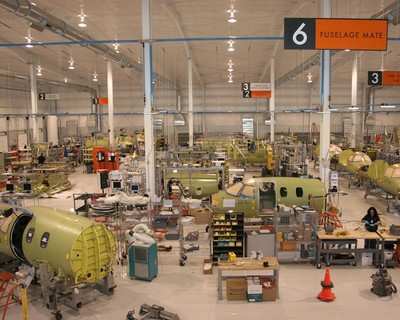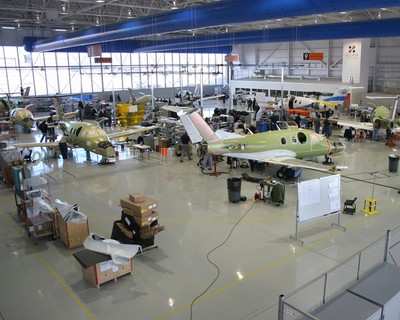Eclipse CEO Takes His Lumps, But Assures Ultimate Success
 ANN recently printed a letter
Eclipse Aviation CEO Vern Raburn sent to Eclipse customers waiting
for jets they've ordered. The letter answered many questions about
the company's problems getting its now fully-certified VLJ into to
production, but we felt there was more to the story and asked him
to speak briefly with us.
ANN recently printed a letter
Eclipse Aviation CEO Vern Raburn sent to Eclipse customers waiting
for jets they've ordered. The letter answered many questions about
the company's problems getting its now fully-certified VLJ into to
production, but we felt there was more to the story and asked him
to speak briefly with us.
Just like his letter, Raburn was very candid and up front. He
was just as willing to take the hit for internal problems as he was
for the company to revel in its accomplishments.
The biggest issue for Eclipse right now is the all-important
production certificate. A production certificate gives the company
full authority -- within strict guidelines approved by the FAA
-- to inspect every aircraft off the line and award an
airworthiness certificate. Without a production certificate each
aircraft must be inspected by the FAA.
In response to ANN's question as to whether Cessna has beaten
Eclipse he said, "Not in any shape, form or fashion. Let's have
this conversation a year from now and we'll see how many Mustangs
are in the field and how many Eclipse's are in the field. The only
thing that matters in this game is deliveries."
Raburn added Eclipse has far more orders for its VLJ than does
Cessna, and the gap continues to widen. Eclipse has logged over 100
new orders since it announced it had received a provisional type
certificate at AirVenture this year. Raburn says most people
mistake certification and first delivery as the contest. He
believes those are goals, but not THE goal.

"It's like racing at the Indianapolis 500. First you have to get
a builder for the car; then a driver; then you need a pit crew and
a good team -- and that's all just so you can qualify!" said
Raburn. "If you qualify, then you get to the starting line.
We're just getting to the starting line."
Asked if he believes Eclipse has stumbled in getting its
aircraft to production he said, "We absolutely are stumbling."
Raburn says just as he does for himself, he holds his company to a
high standard, and right now it's not meeting them.
He says Cessna's Mustang is a wonderful airplane; a standard to
which any aircraft manufacturer would love to compare. "But you're
getting a Citation," he added, "There is little innovation and
little new about it."
Raburn is quick to point out he's not knocking the Mustang, he
just points to the lack of innovation to put Eclipse's problems in
the proper framework. He says any time you choose to do something
different, something that's never been done before you must expect
unforeseen problems. He's acknowledged Eclipse's problems and the
company is working on fixes.

As to those problems... Raburn says the hold up right now is
related to process, not product. He says the quality, safety and
performance of the jet have not and will not be compromised.
The problem is the final inspection procedures for the
production line -- Raburn describes Eclipse's as flawed. He said
his team's familiarity with the process allowed them to proceed
despite the lack of suitable written procedures and acknowledges
that's wrong. "Knowledge doesn't count on the production line."
To approve a production certificate the FAA requires detailed
written guidance on both the building and inspection process.
Detailed instructions ensure even the most inexperienced worker on
the line can do the job the same way every time. They also make it
very easy for an inspector to observe and ensure procedures are
followed. "The inspection is the very last step and we got caught
on that step -- justifiably so. This is not the FAA's problem; this
is an Eclipse problem."
Raburn's relationship with the FAA has always been good. He has
nothing but praise for the FAA team coordinating with Eclipse
in working through this latest setback. "As in any relationship,
there are highs and lows. The past few months have been trying, but
just like a marriage, you must invest heavily in communication to
make [the relationship] successful."

Eclipse's test fleet remains grounded while the company sorts
out a couple of issues. As ANN reported, inspectors
found abnormal wear on a wing fitting bolt and cracks in the outer
acrylic pane of some windows. "Those were problems not in design,
but in manufacture," said Raburn. The company grounded the jets on
its own and has developed fixes for both problems that will be
incorporated into all production aircraft.
Raburn says Eclipse's development process is unique among light
aircraft. He says the test fleet has accumulated over 3,300 hours;
double the industry average for the class. "We're approaching the
number of hours Boeing's 777 had before it entered service." He
said Eclipse wants to find problems like the bolt and windshield
before its customers do. "We don't want to turn our customers into
test pilots."
 ANN asked Raburn how
Eclipse will monitor the fleet as it enters service, especially
since many will be going to individuals instead of fleet operators
more likely to keep good records. He said Eclipse will lease back
the first few jets. In fact, the second off the line will remain in
Albuquerque to be used by Dayjet to train pilots. Eclipse will
perform all the inspections and maintenance placing the company in
a very good position to monitor the aircraft during their initial
entry into service.
ANN asked Raburn how
Eclipse will monitor the fleet as it enters service, especially
since many will be going to individuals instead of fleet operators
more likely to keep good records. He said Eclipse will lease back
the first few jets. In fact, the second off the line will remain in
Albuquerque to be used by Dayjet to train pilots. Eclipse will
perform all the inspections and maintenance placing the company in
a very good position to monitor the aircraft during their initial
entry into service.
"Our production schedule is designed to aggressively pursue what
we believe to be a large market for our product -- expert opinion
notwithstanding," said Raburn, "We have every incentive to ensure
all the issues are worked out before putting planes in customer's
hands. We don't intend to fix problems in the traditional manner of
handing them off to our customers in the form of mandatory service
bulletins."
What does Raburn expect for 2007? He says many scoff at his
company's claims of delivering over 500 aircraft next year,
replying it's "a culmination of years of planning and work." He
says Eclipse gets several visits per year from people all over the
world and almost all are astounded at how well prepared the team is
to meet the coming production challenges.
Asked if he believes the industry, government and public are
ready for the VLJ, Raburn answered, "No one is ready for the impact
the VLJ will have." He says the developers of innovative products
rarely have a full appreciation of the ways their products might
change things. He used the personal computer revolution as an
example.
"There are always applications and effects and unintended
consequences that no one can predict," he said, "We are clearly a
change agent for this industry and some find us massively
threatening. You either embrace change or you are destroyed by it.
I think a lot of entities will be destroyed by the VLJ and that's
simply because they are afraid of it."

Raburn says there has been a more rapid response than expected
to the VLJ as Eclipse defined it six years ago. "I find it ironic
that here's a market segment with a class of airplanes everybody
wants to be everything but a VLJ. They don't want to compete
directly with us so they have all kinds of other terms."
Raburn believes the VLJ market is the most highly competitive in
all of aviation save the newly emerging LSA market. "I think that
validates our vision of six years ago."
When asked to grade Eclipse's performance to date Raburn was as
blunt as always. "For achievements in design and certification; A+.
For meeting schedules and customer expectations; C-. For the
production delay problems; F. And for that one we'll study harder,
work harder and get an A on the next exam!"
 ANN's Daily Aero-Linx (04.13.24)
ANN's Daily Aero-Linx (04.13.24) ANN's Daily Aero-Term (04.13.24): Beyond Visual Line Of Sight (BVLOS)
ANN's Daily Aero-Term (04.13.24): Beyond Visual Line Of Sight (BVLOS) Airborne 04.09.24: SnF24!, Piper-DeltaHawk!, Fisher Update, Junkers
Airborne 04.09.24: SnF24!, Piper-DeltaHawk!, Fisher Update, Junkers Aero-News: Quote of the Day (04.14.24)
Aero-News: Quote of the Day (04.14.24) ANN's Daily Aero-Term (04.14.24): Maximum Authorized Altitude
ANN's Daily Aero-Term (04.14.24): Maximum Authorized Altitude








